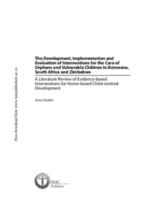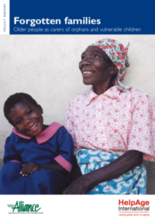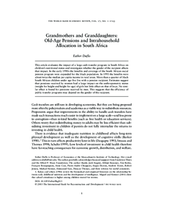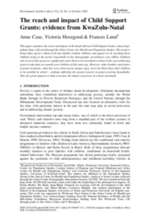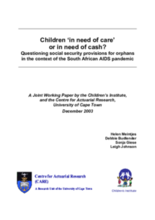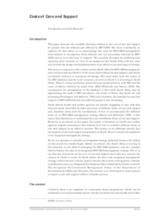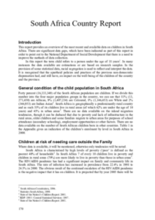childrens_living_arrangement
children_living_without_bio
Displaying 301 - 310 of 311
A report on several pilot projects launched by the World Vision and affiliated microfinance institutions to address the association between poverty and HIV. A description of pilot projects in Zimbabwe, Uganda, South Africa and Malawi are discussed.
Outlines key findings of survey conducted to investigate the challenges faced by households caring for OVC in South Africa. Conclusion delineates six potential responses to community needs.
Discusses the interplay between informal and formal safety net mechanisms in supporting orphans and children made vulnerable by HIV/AIDS. Includes recommendations for strengthening traditional family and community safety nets weakened by the epidemic.
A review of interventions for orphaned and vulnerable children that focuses on community-supported, home-based care examples. Highlights several models and programs, such as the COPE approach and Village AIDS Committees. Advocates the need for more research-based interventions and evaluation.
A publication by International AIDS Alliance and HelpAge International provides an overview of the issues identified by older people and orphans and vulnerable children themselves; examples of community-based programs that are improving the lives of older people and orphans and vulnerable children; recommendations that will help to prioritize orphans and their carers within HIV/AIDS and wider development policies, programs and research.
This research paper discussed the impact of the South African old-age pension program, or cash transfer, on the health of children living with an eligible recipient. It finds that both gender of the recipient and gender of the child living with the recipient are factors in health outcomes.
This research paper evaluates the impact of the Child Support Grant in South Africa. It finds that while there exists a strong commitment to implementation, the presence of a child’s mother is an important factor in program participation.
Research study of the current social security provisions for orphans in South Africa, with a comparison of four alternative cash grant scenarios. Recommends a universal income support system for all children in need.
Discussion of the cost of care and support for children affected by HIV/AIDS in South Africa, with a recommendation for the combined use of state based interventions and community based solutions.
Country report of South Africa on the situation of children in residential care in anticipation of the Second International Conference on Children and Residential Care: New Strategies for a New Millennium, to be held in Stockholm 12 – 15 May 2003.



